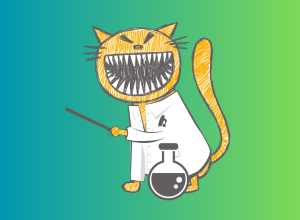As 2016 breathes its last, we are plagued, sorry, blessed by a mini-flurry (Worst. Flurry. Ever.) of pricing changes from platforms. Last week we had Elevate / SL; this week it’s our Dundonian friends, Alliance Trust Savings.
ATS is increasing its fixed fees on both direct and advised business, but offsetting that in part with free trades and reduced trading costs depending on which flavour of their service you use.
STOP! DISCLOSURE TIME!
ATS is a client of the lang cat; we supply PR and marketing services to it. And to further complicate matters, GBST, who supplies the underlying Composer technology to which ATS is currently moving, is also a PR client of ours. So I’m conflicted all over the place on this. If that means you feel you can’t trust what you’re about to read, most of which is just arithmetic, then off you pop. Otherwise, know that I’ll play this with a straight bat. I haven’t given this blog to ATS before publication; nor have the guys there asked me to.
WRAP IS AS WRAP DOES
At the same time as changing custody and trading charges, ATS is introducing a new concept – £700 all in for its complete wrap service; that is to say ISA, IDA and SIPP, with trading included at 35 trades per wrapper per year irrespective of whether those trades are shares, ETFs, ITs, funds or whatever. You also get the model portfolio ‘bundle’, which gives free rebalancing.
Without wanting to be completely facile, that’s 0.14% on a £500k portfolio. Or if you’ve got a client with a £500k SIPP, a £150k ISA and a £75k IDA, for example, it’s 0.096% or under the magic 10bps mark.
Before I get into the analysis, this bears a few more words. I started working in platforms 10 years ago, and one of the things that I believed platforms would do would be to create a completely neutral playground for advisers and clients, where they could allocate wealth across investment and wrapper without any concern that one part would cost more than another. Hardly anyone has gone for this – the economics of outsourcing bits of platform provision always get in the way – and so I’m really keen on this new shape. For my money ATS and 7IM are leading the way here. Whatever your views on other bits of their propositions, I think they now share the crown for the levellest playing field (for reference, 7IM is 0.3% with no trading charges including shares).
READ ALL ABOUT IT
Increases in fixed fees from time to time are part of life; the platform can’t rely on increasing revenue from people adding more money, rising stock markets and so on. This time, though, the rise ATS is putting in is a bit more fundamental, which is to say quite large in percentage terms. Some of that is down to the business not increasing charges in previous years (for example, the advised Inclusive Fee Option or IFO shape hasn’t headed north since 2014). But most of it is, for my money (and I have some with ATS) the sign of a business that’s had a ground-up rethink about its operating model and how it sees the world and is resetting itself for that. I can’t think of much more to say about it than that.
The price changes (cos they’re not all rises) look like this:
ADVISED (STANDARD)
On the standard model prices rise, but you get four free trades bundled in which more than takes care of the increase if you use them (these trades would have cost £50 in the old model).
ADVISED (ALL-INCLUSIVE)
A chunkier rise here, and a reduction of the number of included trades from the strangely precise 37 down to 35. Trading charges above the 35 allowance in the IFO shape remain at £6.25.
ADVISED (OTHER STUFF)
- The model portfolio charge (which gives free rebalancing) rises from £90 to £120
- Regular trading charges and regular dividend reinvestment charges stay unchanged at £1.50 and £5 respectively.
- Trading charges drop from £12.50 to £9.99 (or less if you have loyalty discounts)
- Extra charges are coming in if you don’t use the online service, but you almost certainly do.
DIRECT
- ISA/IDA are £120 a year. SIPP (‘savings’) is £252 including VAT. SIPP (‘income’) is £342 including VAT.
- Regular trading charges and regular dividend reinvestment charges stay unchanged at £1.50 and £5 respectively.
- Trading charges fall from £12.50 to £9.99 a pop or less with loyalty discounts.
- Offline trading charges go up and there are new charges for receiving paper statements etc.
QUICK, PENFOLD! TO THE CALCULATOR!
Here’s what it does to the tables (as ever, just a subset, subscribers get the full whack):
ADVISED ISA
ADVISED SIPP
DIRECT ISA
DIRECT SIPP
If you’re wondering why the direct tables show a price drop, it’s because we assume 4 trades per year: ATS has bundled those trades into its custody fee and that’s enough to offset the rise. We assumed this 4-trade level in our last annual Guide, incidentally, it’s not something we’ve put in for this exercise.
WHAT IT ALL MEANS
So what can we glean from this? Mainly that ATS is still stupidly low cost for larger portfolios. Frankly, it could double its fees and for your wealthier clients (or for yourself if you’re a wealthier direct investor) it’d still rain over most other offerings. A £250k direct SIPP is 0.1% vs 0.45% at Hargreaves Lansdown, for example.
I like that the trading charge has dropped – £12.50 was too much.
The price rise (and it is a rise; a majority of advised clients will pay more) comes at a difficult time. ATS is coming to the end of a replatforming phase and, in common with every other provider who’s been on or is currently on that journey, it has found it challenging. As have advisers and their clients (direct clients haven’t changed yet).
In one way it’s a shame; in another it’s just one of those things. If you use ATS or are thinking of it, I would probably say that it’s good to have all the big changes done and dusted.
If the new charges mean you want to leave ATS, it’s waiving exit fees until 5pm on Friday 27 January for both advised and direct clients. I don’t like exit fees irrespective of who charges them, but fair play for giving people a decent amount of notice and a free pass to the out door if they want it.
Aside from any loyalty I have to my client, the market needs an alternative to percentage based charging. As advisers see more, wealthier clients, it’s more and more obvious that platforms at the top end just charge too much. And yes, some like Transact are trending down; others like Elevate are heading up. ATS has moved the point at which it becomes competitive up; whether it forms part of your world is entirely up to you. Thanks to the Department of the Bleeding Obvious for that last.
So that’s it, and presumably that’s the last charging change before Christmas. It had better be……











